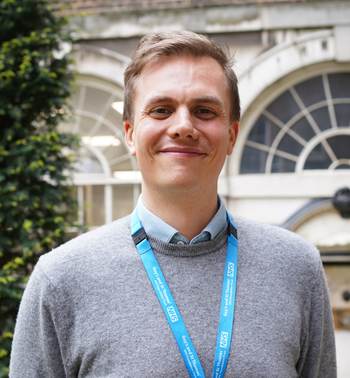23 June 2024
What is your role within King’s Health Partners?
I'm the project manager for the Vital 5 Check programme, in the south east London (SEL) Population Health & Equity Programme.
The Vital 5 are key areas for good health and wellbeing, both now and in the future. They have a big influence on whether residents stay healthy or face the possibility of developing an illness.
The Vital 5 are:
- Healthy blood pressure
- Stop smoking
- Safe drinking
- Healthy mind
- Healthy weight
The Vital 5 Check is a standardised clinical screening tool that helps residents in south east London learn about these core numbers and how they can stay healthy for longer.
In my role, I work with colleagues from across the system to improve and embed the Vital 5 Check. As a recent example of this, I've just completed the first few delivery sessions of a refreshed SEL-wide training package. Getting to this stage involved leading the scoping, development, and design of the package, in consultation with education leads from across the system.
What do you enjoy most about your role?
The ability to work with a wide range of people to embed change that directly benefits residents. Our programme follows a "user-focused" ethos, which means that all decisions are taken with residents and practitioners at the forefront of our thinking. In fact, we regularly connect with residents and practitioners directly so that we can hear their voice and make sure it is at the front and centre of all our work. In this way, we deliver a service that works for the people who give and receive it, which has a wide range of benefits across the whole system.
What inspired you to get into this work?
I enjoy roles that enable me to work closely with a range of people to drive change and improve outcomes for others. I know that there are a wide range of factors that influence outcomes, and I believe that work to reduce inequality is at the foundation of any effective change. In my role, I'm able to work with, lead, and support a range of people to develop and deliver a service that directly targets inequalities in health. I was inspired by the possibility to equitably make a difference at a large scale.
What are the benefits of working in partnership?
A partnership doesn't just bring additional "parts" to the table: a partnership is also a multiplier. It creates the conditions for the constituent "parts" to become "more than the sum of their parts". Nothing exists in isolation, and when people with a range of skills, experiences, and perspectives unite in a clear, defined way to work towards a shared purpose, their potential to add value to whatever they're doing increases greatly.
I think the Vital 5 Check programme is a great example of this. In leading the design and delivery of the SEL Vital 5 Check training package, I worked with education leads and practitioners across the system to ensure we produced an effective, implementable package that avoided duplication and dovetailed well with existing content. And that's just one workstream.
Across the whole programme, we wouldn't get anywhere without colleagues throughout SEL who bring experience in a range of areas such as clinical skills, evaluation, data, communications, resident engagement, research, service delivery, and much more besides!
Of course, bringing in expertise to plug skills gaps in a given area adds a lot of value to a partnership. But something that might sometimes go under the radar is the importance of cross-area input. Someone with a different lens might see an innovative solution taken from their own background and experience that would never have crossed your mind!
This has been a key benefit of our "user-focused" ethos. By consulting practitioners and residents (who might not always be considered partners) we've gained knowledge, experiences, and ideas that have been instrumental in the development of the Vital 5 Check programme and the intervention itself
What would be your one career top tip?
Make sure that your role is the right one for you. What is right is very different for each of us, and that's what makes partnership and collaboration so effective. If we all had the same skills, we wouldn't get anywhere. If you reflect on your values, skills, needs, and what sparks joy for you, you're more likely to end up in a role where you can grow and flourish.





